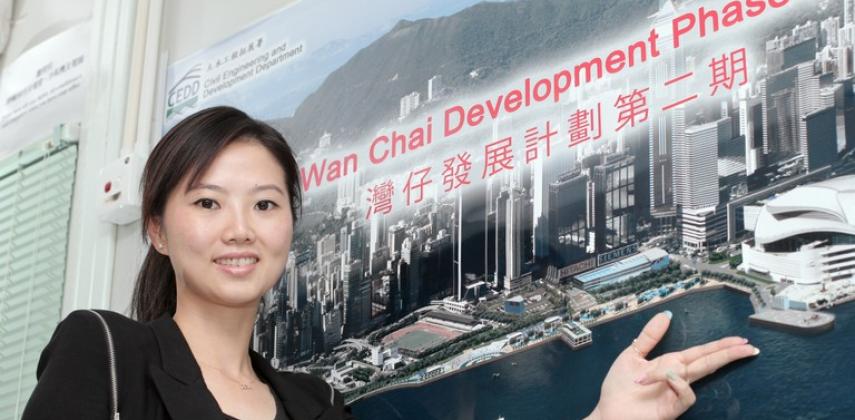Shirley Cheng Shu-wai, resident engineer at AECOM, was inspired to join the construction industry because she was attracted by the diversity of civil engineering and the dynamics of the construction industry.
After obtaining her bachelor’s degree from the University of British Columbia in Canada, and receiving a master’s in environmental engineering from Imperial College London, Cheng began her training as a professional civil engineer in Britain before obtaining professional registration in Hong Kong.
“I joined Black & Veatch in 2006, focusing on the water sector and participating in the design of the expansion of the Tai Po Water Treatment Works. I then joined AECOM in 2011 and broadened my experience in marine and reclamation works. I am currently a resident engineer working on the Wan Chai Development Phase II project to provide land at Wan Chai North and North Point for the construction of the Central-Wan Chai Bypass and Island Eastern Corridor Link,” she says.
Cheng is responsible for supervising the construction of major civil engineering works including seawalls, land formation and underpinning. “My duties are to ensure works are performed in a safe and timely manner, within budget and without causing any significant inconvenience to the public or impact on the environment,” she says.
As an engineer, Cheng’s challenge is to co-ordinate the project stakeholders and balance their interests. “I was involved in the fabrication of a record-sized reinforced concrete structure in Hong Kong, which will become part of the Central-Wan Chai Bypass tunnel. The structure – the size of a standard football pitch – was fabricated on the mainland and transported to Victoria Harbour for installation. The co-ordination work, such as liaisons with marine stakeholders for the towing and installation of such massive a structure onsite, has been the most challenging part [of my job] that I have encountered,” she says.
Construction work is a team effort, Cheng says, and she stresses the importance of being a team player. “The synergy to form a team achieving a collective goal is the drive behind my job. My team members are aware of the challenges, such as deadline constraints and complicated methods of construction, but are able to overcome them using their best efforts. I really enjoy the moment when I am able to finish a task and can put all parties in a win-win situation, and at the same time have them appreciating the efforts I contributed to the project team,” she says.
She advises youngsters wanting a career in construction to be proactive and flexible regarding job duties and work locations. “To be successful, one must be willing to take on various challenges,” she says. “Overcoming a challenge is a valuable experience in career development and is the key to becoming a successful leader.”
Career Advice
Archive
Select article category
Select article category
Career Advice Home
Personal Development and Career path
- Career Doctor
- Career Guidance and Counselling
- English for professional use
- How to Get Promoted
- Job seek in HK
- Plan and start the career path
- Tips to be more productive
- 職場英語 專家教路
How to successed in industry
- Banking and Finance
- Education and Training
- Government and NGO
- Property and Construction
- Startup
Industry Stories, recruitment tips and case study
- Featured stories and job trends
- Legal Case studies for employers
- Recruitment tips
- Successful entrepreneurs’ story
- Successful High flyers’ story
- 職業特搜
Job Market Report, fair and events
- Job fairs and Events
- Job Market Report
- Job Market Trend Report
Select article category
-
Select article category
- Career Doctor
- Career Guidance and Counselling
- English for professional use
- How to Get Promoted
- Job seek in HK
- Plan and start the career path
- Tips to be more productive
- 職場英語 專家教路
Career Advice Home
Personal Development and Career path
- Banking and Finance
- Education and Training
- Government and NGO
- Property and Construction
- Startup
How to successed in industry
- Featured stories and job trends
- Legal Case studies for employers
- Recruitment tips
- Successful entrepreneurs’ story
- Successful High flyers’ story
- 職業特搜
Industry Stories, recruitment tips and case study
- Job fairs and Events
- Job Market Report
- Job Market Trend Report
Job Market Report, fair and events
AECOM's supervisor of change

Jobs Express
,
AECOM
,
Engineer
,
Construction
,
Canada
,
Civil Engineering
,
UK
,
Wan Chai
,
Teamwork
,
Career Insights
,
Black & Veatch
Other Related Articles
Recommended jobs for you
- Job Posting Enquiry
- + 852 3619 9601 (M-F, 9am - 6pm)
- advertise@cpjobs.com
- General Enquiry
- + 852 3619 9600 (M-F, 9am - 6pm)
- info@cpjobs.com
- Partner with: Classified Post
- + 852 2565 8822 (M-F, 9am - 6pm)
- classified@scmp.com
Copyright © 2025. CPJobs International Limited. All rights reserved

